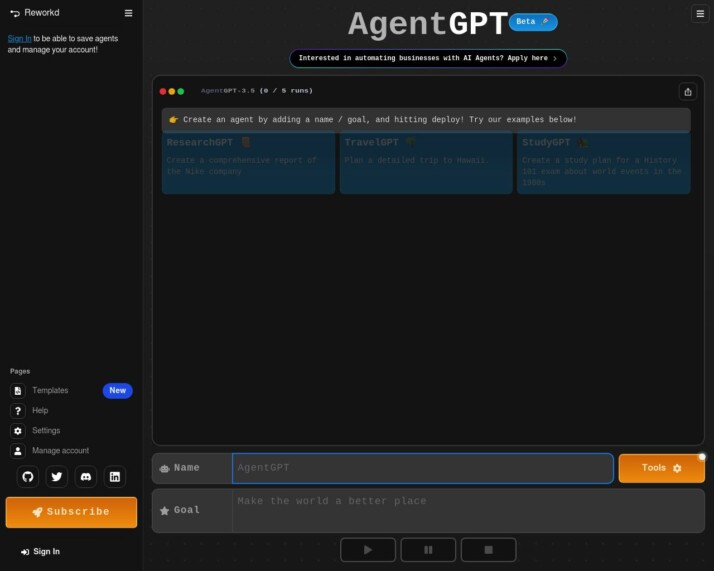Introduction
Are you struggling to make an informed decision between AgentGPT and AilaFlow for your AI needs?
If you are, you’re not alone. With the increasing significance of AI in today’s world, choosing the right platform is crucial. Whether you’re a small business looking to automate tasks, a large organization wanting to leverage AI for data analysis, or even an individual enthusiast trying to learn more about AI capabilities, picking the right AI platform can significantly impact your future growth and efficiency.
In this article, we aim to simplify this complex decision for you. We will dig deeper into the offerings of both AgentGPT and AilaFlow, compare their features, and highlight the unique aspects of each platform.
AgentGPT and AilaFlow, both AI giants, cater to different audiences and use cases, and knowing their most minute differences can be invaluable in your decision-making process. While AgentGPT is renowned for its advanced AI models, boasting capabilities like GPT-3.5 and GPT-4 for sophisticated natural language processing, AilaFlow stands out with its no-code platform, emphasizing user-friendliness and versatility.
Our goal is to provide you a clear, accurate, and comprehensive comparison. By the end of this article, you’ll have a clearer understanding of how these platforms stand against each other and, more importantly, which platform will best suit your specific needs and preferences.
Let’s embark on this journey of discovery and make AI work for you, not against you.
Introducing AgentGPT and its Impact on AI
Are you interested in artificial intelligence? Ever wondered how AI can become more independent and proactive? AgentGPT has an answer to that! It’s an AI platform designed around autonomous AI agents. These agents can act independently and can be assigned specific goals by users.
The agents in AgentGPT make use of GPT models, which are advanced AI models, to enhance their abilities. These models like GPT-3.5 and GPT-4 help in enabling advanced natural language processing, which means your AI agent can understand and generate human-like text!
AgentGPT is unique in many ways. One feature that stands out is its memory management through vector databases. Specifically, it utilizes Weaviate, a hosted vector database, for efficient memory management. This helps in handling complex data structures and enhances the memory understanding capabilities of the AI agents.
Another interesting feature is how it handles security. The platform supports OAuth authentication with multiple providers. This ensures that your AI agents can securely and easily access and integrate with applications or services you need!


So, who can use AgentGPT? It can be used by a wide range of people – from those involved in AI research or enthusiasts looking to explore advanced AI technologies, to businesses and organizations that want to leverage AI for various applications.
Also, tech-savvy IT professionals and system administrators who need reliable infrastructure for deploying AI solutions can benefit from it. And it does not stop there, data scientists and analysts can also find great use for it because it can handle and process both structured and unstructured data.
To sum up, AgentGPT is all about creating advanced and autonomous AI agents. With a focus on improving memory management, providing secure authentication, and facilitating autonomous operation, AgentGPT offers an ideal tool for those keen on exploring and utilizing the potential of AI.
Unveiling AilaFlow: A Powerful AI-based Platform


AilaFlow is a user-friendly platform designed to simplify the process of creating and managing AI agents. Despite not having a capacity to interpret and interact with Microsoft Word documents or plaintext files, this platform presents innovative offerings which will be examined.
- No-Code Platform: It facilitates the generation and modification of AI agents without any need for coding.
- Sequential Workflow Designer: This tool is designed for web use, able to create a variety of applications and works seamlessly with modern browsers and mobile devices.
- Compatibility: The platform supports popular frameworks such as Angular, React, and Svelte, indicating its versatility.
- Customization and Configuration: With features such as light/dark themes, it is adaptable to diverse user preferences and requirements.
The platform doesn’t merely address the needs of technical users. Instead, it appeals to a broad target audience, including non-technical users, business professionals, educators, students, SMEs, AI hobbyists, and cross-platform developers. This diversity in its target audience highlights its adaptability and user-friendly design, making AI technology simpler and more accessible.
Although there have been no recent updates cited in the Commercial-AilaFlow document, the overall company’s vision is clear. AilaFlow is committed to offering a flexible, easy-to-use platform that democratizes the creation of AI agents. This vision is aimed at making AI development within reach of a broader audience, irrespective of their technical background.
A Detailed Feature Comparison: AgentGPT vs AilaFlow
Nowadays, it’s crucial to have a comprehensive understanding of the tools you plan to integrate into your business or project. We’ve prepared a thorough comparison of AgentGPT and AilaFlow, two powerful AI software options. Learn the strengths and weaknesses of each to determine what can best suit your needs.
| Features | AgentGPT | AilaFlow | SmythOS |
|---|---|---|---|
| Hosted Agents (Dev, Production) | ✅ | ❌ | ✅ |
| Environments (Dev, Production) | ❌ | ❌ | ✅ |
| Visual Builder | ❌ | ✅ | ✅ |
| No-Code Editor | ❌ | ✅ | ✅ |
| Memory & Context | ✅ | ❌ | ✅ |
| Problem-Solving Capabilities | ✅ | ✅ | ✅ |
| Human-AI Interaction | ✅ | ✅ | ✅ |
| Foundation AI’s | ✅ | ✅ | ✅ |
| Deploy as GPT | ✅ | ❌ | ✅ |
| Autonomous Agents | ✅ | ❌ | ✅ |
Looking at the comparison table, it’s apparent that both AgentGPT and AilaFlow offer unique features as well as shared ones. For instance, both have stellar problem-solving capabilities and human-AI interaction. However, AgentGPT stands out by providing memory & context, autonomous agents, and OAuth. These differences can impact the way businesses use these Large Language Models (LLMs), tailoring their choice depending on specific needs.
AilaFlow, with its visual builder and no-code editor features, provides an easy and accessible avenue for users who may not be well-versed in coding. This reduces the entry barrier and allows for a wide range of people to utilize AI technology.
Audience Analysis: AgentGPT and AilaFlow
This section examines the intended audience and end users of AgentGPT and AilaFlow, highlighting the specific use cases and applications that each product caters to.
- Audience: AgentGPT and AilaFlow target a technically adept audience, including professionals and organizations in the software development, AI research, and technology sectors.
- AgentGPT: AgentGPT is an AI platform that caters to AI researchers and enthusiasts, IT and systems administrators, businesses and organizations, and data scientists and analysts.
Key highlights of AgentGPT include:- The use of advanced AI models like GPT-3.5 and GPT-4 enables sophisticated natural language processing and generation capabilities.
- Features like the Superagent Cloud Platform offer a robust and efficient environment for running and managing agents, catering to IT professionals and systems administrators.
- The platform’s ability to handle complex workflows and provide meaningful interactions with users through AI assistants makes it valuable for businesses and organizations.
- Data scientists and analysts benefit from its handling and processing of both structured and unstructured data sources.
- AilaFlow: AilaFlow is a no-code platform designed for non-technical users, business professionals, educators and students, small to medium enterprises (SMEs), AI enthusiasts and hobbyists, and cross-platform developers.
Notable features of AilaFlow include:- The platform’s simplicity and no-code approach make it accessible to individuals and organizations without extensive programming knowledge.
- Sequential workflows and ease of use make it ideal for business professionals.
- Educational settings benefit from AilaFlow’s simplicity and no-code approach.
- SMEs can leverage the platform’s automation solutions without requiring specialized staff.
- Cross-platform developers appreciate the platform’s compatibility with various frameworks and devices.
Both AgentGPT and AilaFlow cater to specific audiences and offer unique features in their respective domains. However, when compared to SmythOS, SmythOS stands out as the favored choice due to its advanced features, flexibility, and comprehensive toolset that cater to a wide range of users.
Conclusion
The comparison between AgentGPT and AilaFlow reveals the advantages and disadvantages of both platforms. AgentGPT leverages advanced AI models like GPT-3.5 and GPT-4, enabling sophisticated natural language processing and generation capabilities. It focuses on creating autonomous, sophisticated AI agents with advanced memory management and secure authentication capabilities. However, the document lacks extensive details on deployment, hosting, and collaborative functionalities.
On the other hand, AilaFlow offers a no-code platform that emphasizes ease of use and versatility. It caters to non-technical users, business professionals, educators and students, small to medium enterprises, AI enthusiasts and hobbyists, as well as cross-platform developers. The platform provides a simple and intuitive interface, making it accessible to a wider audience.
In comparison, SmythOS stands out as a favored AI solution due to its unique offerings and features. The platform prioritizes user experience, flexibility, and a robust toolset. With SmythOS, users can harness the power of AI to create sophisticated conversational agents and integrate AI into various applications and services. Its compatibility with different frameworks and devices further adds to its appeal.
While both AgentGPT and AilaFlow have their strengths, SmythOS emerges as the preferred option. Its unique features, adaptability, and focus on user experience make it the ideal choice for those seeking to leverage AI for innovation and efficiency.
Last updated:
Disclaimer: The information presented in this article is for general informational purposes only and is provided as is. While we strive to keep the content up-to-date and accurate, we make no representations or warranties of any kind, express or implied, about the completeness, accuracy, reliability, suitability, or availability of the information contained in this article.
Any reliance you place on such information is strictly at your own risk. We reserve the right to make additions, deletions, or modifications to the contents of this article at any time without prior notice.
In no event will we be liable for any loss or damage including without limitation, indirect or consequential loss or damage, or any loss or damage whatsoever arising from loss of data, profits, or any other loss not specified herein arising out of, or in connection with, the use of this article.
Despite our best efforts, this article may contain oversights, errors, or omissions. If you notice any inaccuracies or have concerns about the content, please report them through our content feedback form. Your input helps us maintain the quality and reliability of our information.
Alexander De Ridder
Co-Founder, Visionary, and CTO at SmythOS. Alexander crafts AI tools and solutions for enterprises and the web. He is a smart creative, a builder of amazing things. He loves to study “how” and “why” humans and AI make decisions.
Explore All Comparison Articles
Decisions vs. Sola: AI Workflow Automation Showdown
AI-powered workflow automation platforms revolutionize how businesses streamline operations and boost productivity. This comparison explores Decisions vs. Sola, and SmythOS,…
DeepOpinion vs. Sola: Comparing AI Automation Platforms
AI-powered automation platforms revolutionize business operations, but choosing the right solution can be challenging. This comparison of DeepOpinion vs. Sola,…
DevGPT vs. Sola: AI-Powered Development Tools Compared
AI-powered development tools revolutionize software creation, offering unprecedented efficiency and capabilities. This comprehensive review compares DevGPT vs. Sola, and SmythOS,…
Fine AI vs. Sola: Comparing AI Automation Tools
AI-powered automation transforms software development and business workflows, offering unprecedented efficiency and innovation. Fine AI vs. Sola present distinct approaches…
FlowiseAI vs. Sola: Comparing AI Automation Platforms
AI-powered automation revolutionizes business operations, driving efficiency and innovation across industries. FlowiseAI vs. Sola offer distinct approaches to harness this…
Gooey AI vs. Sola: AI-Powered Automation Platforms Compared
AI-powered automation platforms revolutionize how businesses streamline operations and enhance productivity. This comparison delves into Gooey AI vs. Sola, two…

